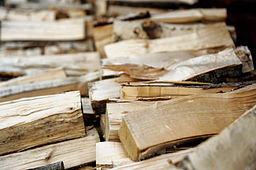 On the Not One-Off Britishisms blog Ben Yagoda discusses "chokka" as a Britishism in American English (comments also refer to the frequency of other spellings, especially "chocker"):
On the Not One-Off Britishisms blog Ben Yagoda discusses "chokka" as a Britishism in American English (comments also refer to the frequency of other spellings, especially "chocker"):My neighbor Mike Eiseman, about to embark on a trip to England, told me he was studying up on the native lingo, and mentioned a couple of words he had learned, one being “chockablock.”
I wasn’t aware of this as a Britishism, but I’m not aware of a lot of things, and I dutifully looked it up. The OED’s definition said it was originally used as a nautical term: “said of a tackle with the two blocks run close together so that they touch each other—the limit of hoisting; transf. jammed or crammed close together; also of a place or person, crammed with, chock-full of.”
The first citation in the OED was from an American, Richard Henry Dana, in Two Years before Mast: “Hauling the reef-tackles chock-a-block.” The second, ten years hence, was from another Yankee seaman, Herman Melville.
We have in Jèrriais the word "tchaque", defined in the dictionary as "chock full", presumably a borrowing from English, perhaps a maritime borrowing. We also have the verb "tchaquenarder" = to jostle. Whether the existence of the verb helped the assimilation of the English "chock" is a matter for speculation.
Idiom:
I' s'tchaquenardait la chèrvelle = he racked his brains
Of course the English "chock" is by no means as English as it may appear, for if tchaque is chock then chock is really only being welcomed back to its Norman roots after an English vacation! English borrowed our Norman word chouque which became chock.
Chouque is also one of the Jèrriais words that crop up in Jersey English, used for example to refer to logs or firewood.

No comments:
Post a Comment